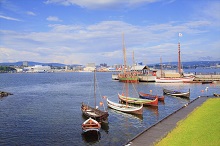Economic Power and Unique Culture - Exploring the Potential of Norwegian Translation
November 21, 2016

Hello. I am Yucchi, a fledgling translator who transferred last autumn from a different field. I've only just started in translation so I have much to learn, but I'm studying hard with the help of my seniors.
The Kingdom of Norway in northern Europe is well known for its high quality of public welfare, and its beautiful nature such as its fjords and forests. The image of vikings may also come to mind. At the same time, we hear of its stable economy supported by its rich oil resources. What kind of country is Norway, and what might be the attractiveness of Norwegian translation?
Features of Norway and the Norwegian Language
Norway has an area quite similar in size to Japan, where approximately 5,150,000 people live surrounded by a rich natural environment. It is well known for its good welfare system, and has high labor efficiency, as well as being advanced in the area of gender equality. For example, taking childcare leave is mandatory for men, and there is a system ensuring a fairly equal mix of men and women in the parliament.
Moving on to the history of this country, from the ninth to the eleventh century was the famous age of the vikings. The techniques and technology used for such things as shipbuilding, navigation, and trade are still passed on to the present generation. Eventually Norway became united as a single country, but it suffered several difficult times, such as the loss of half its population to the Black Death, the creation of a union with Denmark and Sweden, and occupation by the Nazis during WWII. Nevertheless, offshore oil fields and natural gas fields were found off the coast of Norway in the late 1960s, and the country has since been recognized as a developed country.
The language spoken in Norway is Norwegian. This language belongs to the Germanic subgroup in the Indo-European language family. Norwegian closely resembles Swedish and Danish, and the speakers of these three languages can understand each other to a considerable extent. The alphabet is made up of 29 letters; 26 from the Latin alphabet with the addition of three more. It also shares some characteristics with English, and there are many similar words between the two languages. However the grammar is simpler, with fewer inflections, and is said to be a relatively easy language to learn.
Norwegian Economy: Oil, Marine, and Marine Products
One major factor that makes it possible for Norway to provide a high-quality welfare system is its stable economy, which is built on its abundant oil resources. Other than oil, it has marine and marine products as its three main industries. Exports to Japan consist mainly of oil and marine products. I'm sure many Japanese have had Norwegian salmon before.
Renewable energy is also being developped, and the area of solar energy especially is showing remarkable growth. Norway has also pushed for research on wind-power generation technology, and they have been operating their offshore wind power generating turbine since 2009. Sales of electric vehicles are also going well, and in the Norwegian market, electric vehicles account for a higher percentage of new car sales than any other country in the world. This is due to the high level of awareness the citizens have towards the environment, but I also think the government's incentive policies such as the exemption or reduction of tax when buying an electric vehicle, free charging stations, toll-free expressways, and free parking have also contributed to a great extent.
Additionally, Norway has a high level of marine-related IT that allows ships to navigate more efficiently and safely, as well as technology to prevent marine pollution. Being surrounded on all sides by the sea, Japan may have a lot to learn from Norway.
Norwegian Culture: Spread of Japanese Anime in Norway
In recent years, interest for Japan has been increasing in Norway, especially between young people who are interested in pop culture. There are many fans of Japanese anime and manga, and an increasing number of people are learning Japanese. Participation in anime festivals is also on the rise. By translating information on pop culture into Norwegian, I think Norwegian people, especially the younger generations, will develop further interest in Japan.
On the other hand, Norway exports its own unique culture too. For example, bubble soccer, which originates in Norway, seems to be spreading in Japan as a novel sport that can be enjoyed by everyone. There is also an unusual television program broadcast by the Norwegian Broadcasting Corporation titled "Slow Television", which became widely popular in Norway. Simply broadcasting unedited videos for hours of things such as a fire burning in a fireplace, scenery from the window of a running train, or fishing salmon, it has caught people's attention in other countries as well.
As we have seen, Norway with its well-known welfare policies is a country with a stable economy backed by oil resources as well as a rich natural environment. With oil, marine, and marine products as its main industries, it is also advanced in renewable energy, environmental technology, and marine-related IT. Having done this research, I received the impression that Norway is a country that maintains a good balance between its natural environment and its economy.
Related Services
| << Marguerite: The Secrets behind the Floral Emblem of Denmark - A Country In Love with Fairy Tales | Exploring Moomin's Homeland of Finland and the Finnish Language >> |
To Contact Us Regarding Our Translation Services
For urgent needs, call:
+81-3-5730-6133
